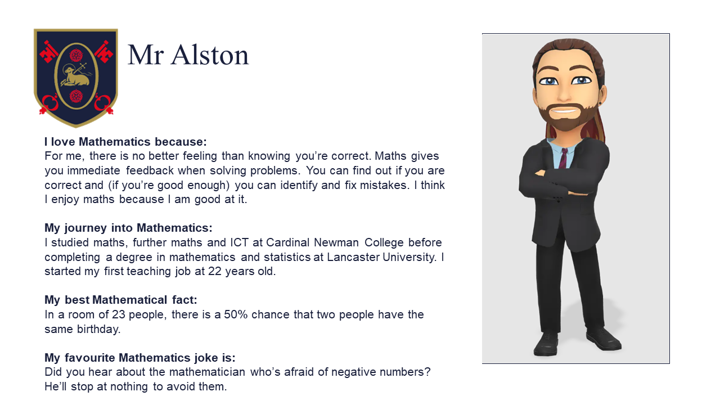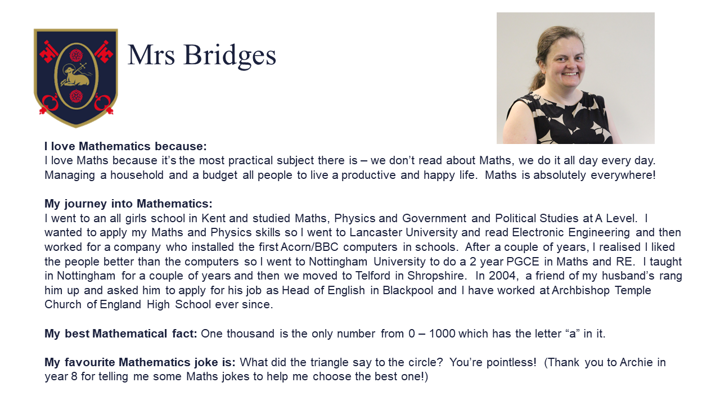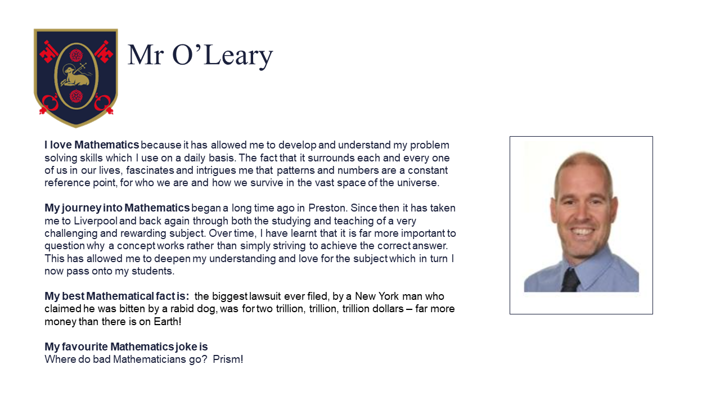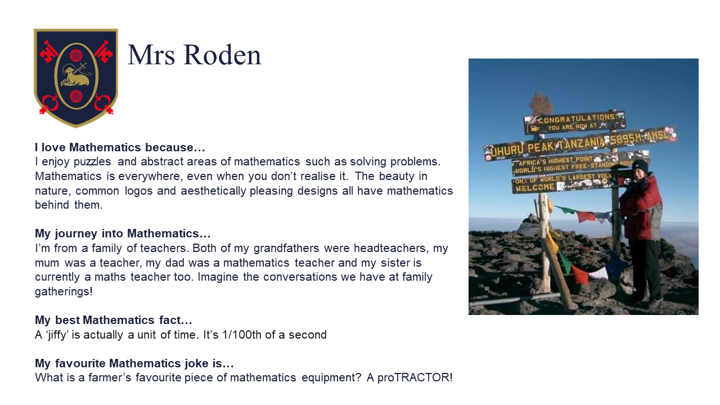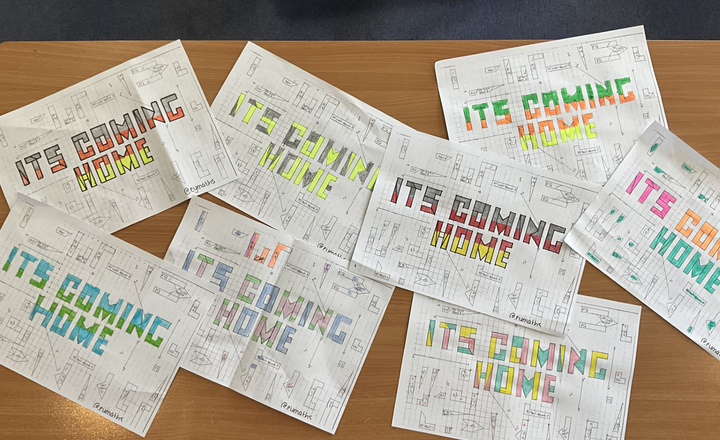Subject: Mathematics
CURRICULUM INTENT
The intent of our Mathematics curriculum is to design a learning experience that is accessible to all and will allow each pupil to demonstrate their gifts and talents within the subject. Mathematics helps us see the order and beauty of God’s creation and thus of God himself. Teachers enjoy mathematics, receive it gladly and thankfully as God’s gift, and cultivate a classroom climate in which students enjoy the subject and strive to develop themselves.
We have designed the Scheme of Learning to be inclusive, supportive, challenging and enriching for all pupils across the school. The curriculum is accessible to all pupils, allowing them to build on pre-existing knowledge from Key Stage 2, whilst also providing opportunities to see how topics interleave and develop further. In turn, this allows us at school to foster an attitude of deeper reflection on what mathematics can do for us here and on what its order and beauty tell us about God and his creation.
Whilst we strive to prepare pupils to be fluent in basic Mathematics for their life after secondary school, we also endeavour to inspire a love of maths to encourage pupils to continue the study of maths or maths-related subjects in higher education. Pupils are shown explicitly how mathematics fits into our God-given stewardship of the earth and into the building of human communities. Thus, teaching is contextualized and so we establish clear connections within areas of practical life, which subsequently can therefore be applied within the wider world.
There are many subjects in school which rely on strong Mathematical skills to improve the efficiency of their learning. Science, Geography, Technology and Computing to name but a few, benefit significantly from having pupils that are fluent in reasoning and problem solving, so that their own subject knowledge gained from Mathematics lessons can be applied in other areas of the curriculum.
As a result, we as besides creating young mathematicians, are also aiding in the development of the spiritual progress of our pupils here; so that they become rounded, thoughtful and responsible young citizens, who are ready to excel and achieve their God given potential.
IMPLEMENTATION
The content and principles underpinning our Mathematics curriculum here at Archbishop Temple Church of England High School focus primarily on the teaching of our pupils, which is underpinned by methodical curriculum design and supported by carefully-crafted lessons and resources to foster deep conceptual and procedural knowledge.
Programmes of Study
Year 7
In Year 7, students are taught the fundamental principles which will enable them develop their mathematics over the next five years. All pupils follow the same rigorous Scheme of Work which develops topics previously taught at KS2. Pupils are introduced not only to procedural content, but also to the world of problem-solving. By the end of the year, all pupils should be familiar and fluent with basic algebraic techniques and proportion, fractions, decimals, factors and coordinate geometry.
Year 8
The Year 8 Programme of Study introduces pupils to the use of formula (both creating and using them) in order to develop problem-solving techniques. Essentially, basic skills from Year 7 are built upon in the first half the scheme of work. These algebraic skills are expanded upon and pupils develop skills in solving complex equations and number patterns. As the scheme develops, pupils are introduced to more Geometry; this involves both area and angular measurements of shapes (often this is entirely new to pupils) but requires skills taught previously in Year 7. Towards the end of the year further statistics and the world of data analysis is introduced to pupils. This area is fundamental in showing pupils the relevance of everyday data and how it can be interpreted and used to influence predictions and trends.
Year 9
As we approach the end of Key Stage 3, pupils’ skills are further tested and developed. Many new topics are taught at this stage, enabling pupils to develop them at Key Stage 4. The year begins with number work. Here, pupils are shown how to manipulate Indices and Surds and then apply them in the shape-based modules which follow. The often scary world of Trigonometry is opened up to pupils and, for the first time, the use of a calculator is explored. Further problem-solving techniques are looked at, introducing Simultaneous Equations coupled with developing linear graphs (seen in Year 7) which brings a whole host of topics together. As the course nears its end, pupils extend their knowledge of Statistical Analysis and how this plays a huge part in life outside the classroom setting.
Year 10 & Year 11
At the start of the course in Year 10, pupils follow our own GCSE courses which suits their individual needs. The four strands of mathematics: Number, Algebra, Geometry and Data Handling are all covered in depth in order to further enhance a pupil’s ability to problem solve and to master skills within the subject. The course allows pupils to gain confidence within the subject and develop their understanding so as to allow them to reach their own potential. This culminates in an intensive revision programme which begins at the start of the Spring Term in Year 11.
IMPACT
The impact of our Mathematics curriculum is that children understand the relevance of what they are learning in relation to real world concepts.
High-quality assessments at the end of each term, allow pupils in our care to demonstrate their growing understanding of the subject, whilst also allowing teachers to assess the impact of their teaching; these assessments are taken at the end of each unit. In addition, teachers focus on formative assessment lesson by lesson.
Our formative assessments are designed to support students in achieving fluency in each topic. This means that in lessons pupils are quizzed on prior knowledge in order to embed these skills in their long-term memory. Our teachers explicitly teach the meaning of subject-specific language and we expect lessons to contain challenging and purposeful material.
Every child has an equal right to an interesting and challenging curriculum. By teaching this curriculum well and developing effective habits in our pupils we bring out the best in everyone.
Marking and Assessment
Refer to ARR policy (Firefly)
Formal assessments will take place at the end of each term throughout the Scheme of Work of which staff will provide feedback and guidance as to how to improve. There will be regular monitoring of students’ work during lessons, the vast majority of this will be verbal feedback to guide students in class, so as to have the maximum impact upon their learning. We make the most of the opportunity for peer and self-evaluation throughout each lesson. Home learning is marked and delivered through the Sparx home learning package which is monitored weekly.
Examinations
Edexcel GCSE Mathematics (1MA0H/F)
Students will take three end-of-course examinations at the end of Year 11. This comprises of one Non-Calculator and two Calculator examination papers (each 1hr. 30 mins. duration).
Careers and Progression
Upon leaving Archbishop Temple, a good mathematics qualification can open up so many career opportunities. It’s not surprising that mathematics was one of the most popular A-level choices for our pupils leaving this summer.
Mathematics is one of the best subjects to develop your analytical, research and problem-solving skills. Not only will studying mathematics help give you the knowledge to tackle scientific, mechanical, coding and abstract problems, it will also help you develop logic to tackle everyday issues like planning projects, managing budgets and even debating effectively.
A spokesperson for the Institute of Mathematics and its Applications says: "A-level maths is tremendously important. It provides a firm foundation for all scientific, technical, engineering and mathematical careers and a flying start for many other types of career, such as those in finance, medicine, agriculture … etc. The list is endless!"
Maths A-level is essential for degrees in physics, engineering, actuarial science, economics and, of course, maths, although you may need to study a further maths course as well to do this.
Maths is recommended, or sometimes required, for: computer science, accounting, chemistry, biology and life sciences, medicine/nursing, dentistry, business studies, management studies, finance, architecture, geology, psychology, surveying and even philosophy.
Maths 5 year Curriculum Plan
Click on an image below and scroll through using the arrows.
Related News

Mathematics Week 2024
.jpg)
